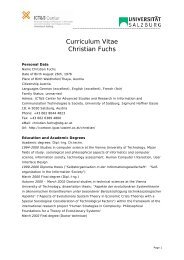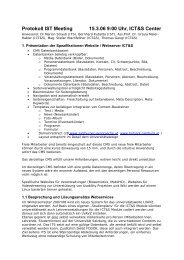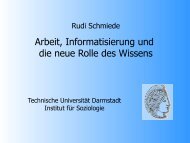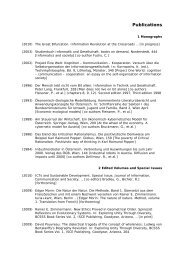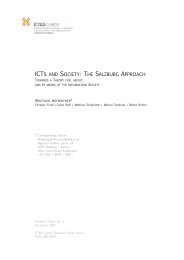CHRISTIAN FUCHS - ICT&S - Universität Salzburg
CHRISTIAN FUCHS - ICT&S - Universität Salzburg
CHRISTIAN FUCHS - ICT&S - Universität Salzburg
You also want an ePaper? Increase the reach of your titles
YUMPU automatically turns print PDFs into web optimized ePapers that Google loves.
Christian Fuchs: Social Networking Sites and the Surveillance Societye.g. “Bush Lets US Spy on Callers Without Courts”, New York Times, December 16,2005).• The US-VISIT program requires travellers from certain countries entering the USA tohave their fingers digitally scanned and to be digitally photographed.• In 2002, the Bush administration planed to implement the Terrorism Informationand Prevention System in which data on suspicious citizens gathered by workerswho had access to private homes (such as mailmen) would have been stored indatabases.• Total Information Awareness (TIA) was a project started after 9/11 by the USInformation Awareness Office that aimed at identifying potential terrorists bymethods of collecting information and combing and assessing data from differentalready existing databases. Following heavy public criticism and civil rightsconcerns, Congress suspended the program in spring 2003.• In 2004, an agreement between the USA and the EU was signed that requiredEuropean airlines to transmit Passenger Name Records (PNRs) on transnationalflights to the US in advance of flights to US authorities. PNRs include 34 data setssuch as full name, passport details, date and place of birth, contact details, address,phone number, e-mail address, flight data, form of payment. In 2006, the EuropeanCourt of Justice annulled the agreement and a new temporary agreement wasreached in fall 2006. The main difference to the old agreement is that data is passedfrom airlines to the US Department of Homeland Security (DHS) based on requests(data push), whereas in former times the latter had continuous access to thedatabases of the first (pull). The requests are not limited in number, rather transfer isdefined as required by DHS.• In spring 2006, the EU adopted the Date Retention Directive that requires allmember states to pass bills that require communication providers to storeconnection data (identity of source and receiver of a communication, date, time,length, provider, location data of mobile phones during calls, etc.) of all phone andinternet communications for a period between 6 months and 2 years.• The Computer Assisted Passenger Prescreening System (CAPPS) has been introducedin US aviation. It compares PNRs with data of the FBI and other agencies in order tocalculate a terrorism risk score so that extra-screening of certain people and theirluggage becomes possible.• The Echelon system is a UK-US spy network that can intercept radio and satellitecommunication, phone calls, e-mails, and Internet data (cf. Lyon 2003, 96f; Wright2005). Not much is known about this system, its functions and hence one can onlyspeculate on its increasing importance after 9/11.As already mentioned, the European Commission passed the Data Retention Directive(2006/24/EC) on March 15, 2006, which requires all member states to pass laws thatguarantee that information and communication service providers store source,destination, and other data on a communication for at least 6 months. The data thatneeds to be stored includes:“(a) data necessary to trace and identify the source of a communication (...)(b) data necessary to identify the destination of a communication (...)(c) data necessary to identify the date, time and duration of a communication (...)(d) data necessary to identify the type of communication (…)(e) data necessary to identify users’ communication equipment or what purports to26



